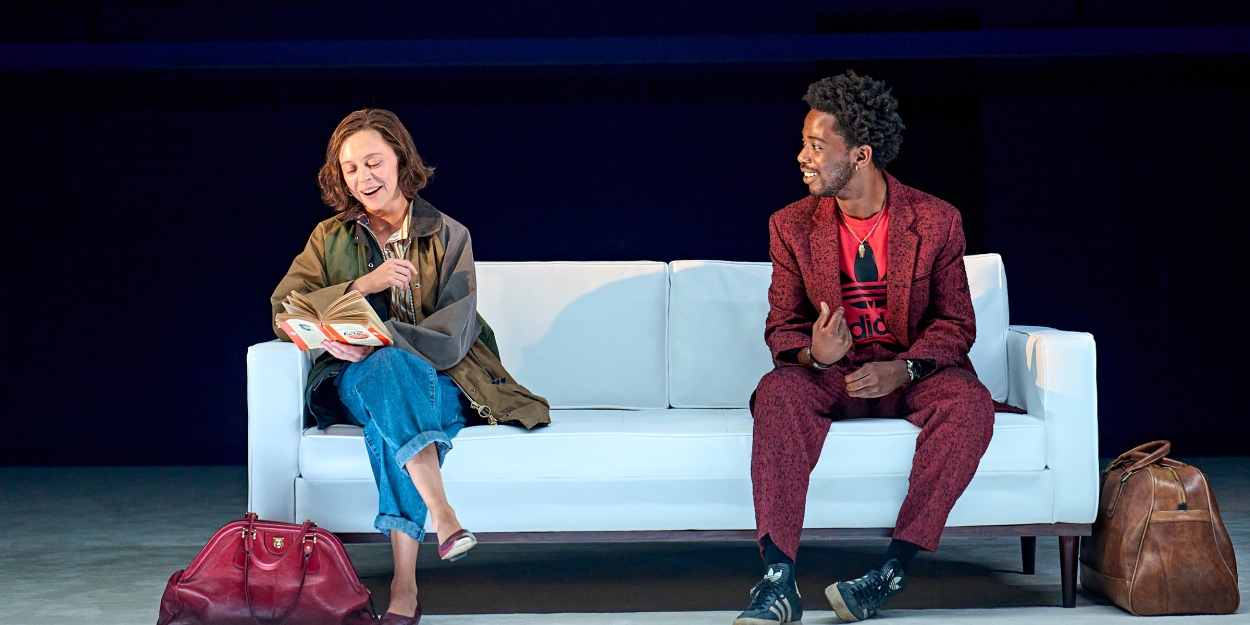Review: THE REAL THING, The Old Vic
Classic play by Sir Tom Stoppard fails to land

 Symposiums (or symposia, as the Pedants’ Pedant, Henry, would no doubt instantly inform me from beneath his half-hearted mullet) are the places to explore ideas about writing. Stages should be reserved for characters we believe in, in whom we can invest hopes and fears, maybe even grow to like - after all, we’re lumped together for two and a half hours, so let’s get along hey?
Symposiums (or symposia, as the Pedants’ Pedant, Henry, would no doubt instantly inform me from beneath his half-hearted mullet) are the places to explore ideas about writing. Stages should be reserved for characters we believe in, in whom we can invest hopes and fears, maybe even grow to like - after all, we’re lumped together for two and a half hours, so let’s get along hey?
Such thoughts filled my head, as the play I witnessed seemed barely worthy of praise, never mind the avalanche of plaudits that have come its way since its premiere 42 years ago and consequent to its many revivals since. Had I missed something? In pooh-poohing the assessments of so many fine judges, was I just being a bear of very little brain? Or had this soapy tale (albeit with longer words, but almost as much shouting) merely outlived its utility? Probably a bit of all three.
It’s a tricksy opening, a play-within-a-play that already felt like poison being dropped into my ear, as smartypants Stoppard stops us in our tracks with a clever little reveal about an actress’s infidelity with her husband. Meanwhile, in real life, the real thing is already underway, an actress’s infidelity about to go public, as Henry, the playwright, leaves Charlotte, the actress, for Annie, the actress, erstwhile wife of Max, the actor. Later, Billy, also an actor, has an affair, Debbie turns up to provide some teenage wisdom beyond her years and Brodie arrives, with his not so quaint working class ways, to be bullied and patronised.
If that sounds hard work and just a bit intellectually incestuous, it is, but not immediately. In the first half, James McArdle’s Henry is merely irritatingly pompous and often actually quite funny in a Desert Island Discs riff that is intermittently amusing. That said, the joke has aged badly as surely nobody would be surprised these days if James Graham picked, say, “I Should Be So Lucky” as one of his eight songs. (There’s an extended cricket bat metaphor later that also doesn’t work in 2024, when bats are lightweight, powerful, but terribly fragile).
%20and%20Oliver%20Johnstone%20(Max)%20in%20The%20Real%20Thing%20at%20The%20Old%20Vic%20-%20credit%20Manuel%20Harlan.jpg)
Though we can see why Annie has her head turned in Scotland by the charming and sexy Billy (Rilwan Abiola Owokoniran in quite the show-stealing performance), Bel Powley never establishes any chemistry with McArdle - it’s hard to see any mutual attraction at all and hence there’s a void where the heart of the play should beat.
There are lots of extended disquisitions on the nature of love, of the mutability of truth and the process of writing. That’s okay, leavened as they are before the interval with wisecracks and wit, with Susan Wokoma in fine form as the earthy Charlotte, Henry’s first wife, whose libido is never knowingly undersold. Later speechifying overtakes speeches (does anyone really talk like this?) as Henry and Annie take positions on issues, compete to see who can be the more selfish and finally arrive at an accommodation that might work for her, but won’t for him, his ‘modern’ attitudes proving something of a sham.
Karise Jansen gets a cameo, with which no actress could do much, as the daughter who further punctures Henry’s sense of entitlement very much her mother’s DNA coming through. I hope Jack Ambrose’s future includes less caricatured roles than that of the Glaswegian Corbynista (35 years too early for that bandwagon) Brodie, whose garbled prose Henry is required to ghost write into life. How we laughed (well some did) when the smartset humiliated him for his yobbish manners and uppity ways. I thought of The Cherry Orchard’s Lopakhin, but not for long. Oliver Johnstone's Max appears to be largely forgotten.
Whether director, Max Webster, is inviting us to join in that scorn, I wasn’t sure. Though such uncertainty is often a welcome attribute in a play, here it just felt indulgent - we can’t be laughing at social gaucheness these days, can we? Likewise, it is unclear whether we are invited to pity the cuckolded Henry or not - that said, his capacity for pity is probably filled by his generating voluminous quantities of his own.
I wondered if I were alone in my lukewarm reception of a work that gets on to ‘The Hundred Best Plays of the 20th Century’ lists and the like, but here’s Ros Asquith, writing in the much-missed City Limits, back in 1982. “I found my happiest moments were spent listening to the Golden Oldies which punctuated the scenes.” I too sought solace in The Righteous Brothers when I tired of the self-righteous brother, Henry, and his relentless philosophising.
The Real Thing at The Old Vic until 26 October
Photo Credits: Manuel Harlan


